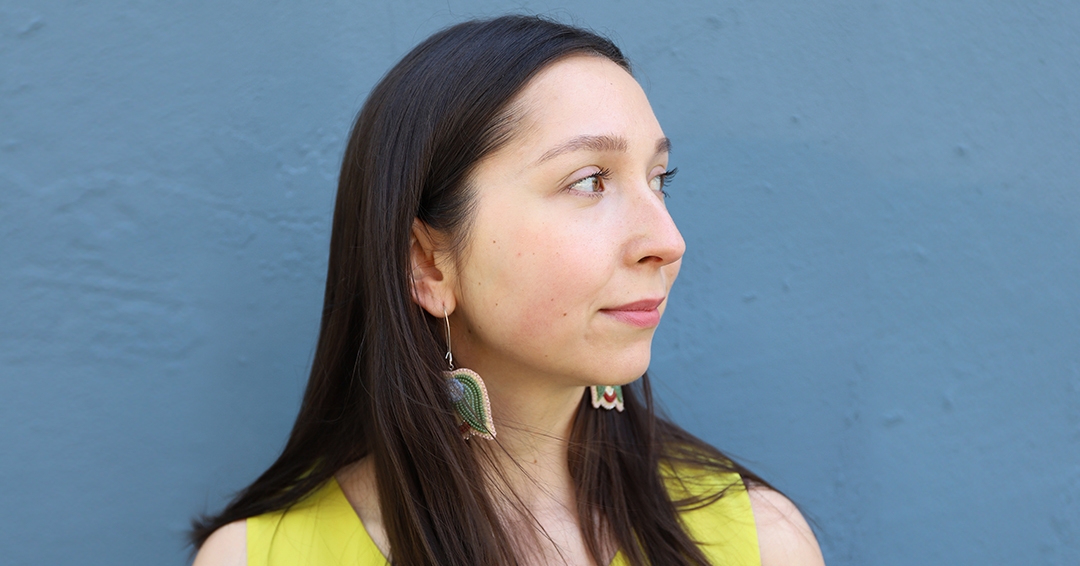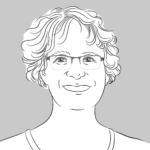
Working closely with faculty and staff, Ms. Lavallée is excited by the opportunity to contribute to systemic change at McGill University’s School of Nursing.
In addition to a Bachelor of Science in Nursing, a Master of Science in Community Health Sciences and experience in community health nursing, Josée Lavallée brings Indigenous values such as relationality and reciprocity to her new role as inaugural director of the Ingram School of Nursing’s (ISoN) Office of Social Accountability in Nursing (OSAN). More than just theoretical concepts, these values are how she walks through the world, much like her ancestors have done for many generations before her.
Josée Lavallée(she/her) is Red River Michif with mixed settler ancestry on both sides of her family and grew up in Winnipeg, on Treaty 1 Territory. Josée is active in her community as the Youth Representative for the Manitoba Métis Federation’s Bison Local. Coming from a French speaking family, she mostly spoke English at home and attended French immersion from elementary through high school. When she decided to pursue a career in nursing, her desire to become more proficient in French led her to study at Université de Saint-Boniface, where she obtained her BScN.
Nursing school was a good experience overall, especially in the clinical setting, where she excelled at caring for patients. “Unfortunately, I also was exposed to the racism that exists within health care practices and systems,” she recalls.
Propelled by a strong passion for social justice and advocacy for Indigenous well-being, she set her sights on community health nursing, gaining broad experience and skills in adult ER nursing and the Neonatal Intensive Care Unit before transitioning to community health.
“Health is rooted in community well-being, which, in turn, requires building relationships based on trust,” explains Ms. Lavallée. While she felt somewhat fulfilled working in community settings, she also recognized the need for systemic change, and wanted to play a role in shaping policy at a higher level. Enrolling in the master’s program at the University of Manitoba’s Rady Faculty of Medicine was an intuitive choice that turned out to be the perfect fit. Her thesis titled “Learning From Each Other, Together: Exploring Red River Métis Youth Experiences in Cultural Activities Through Relationality” allowed her to explore the interrelated nature of Red River Métis culture and health. This thesis was also an opportunity to critically examine and challenge the norms of how a thesis is expected to be written by Indigenizing her writing to reflect the value of relationality from the knowledge that she gathered and was gifted.
As Director of the OSAN, Ms. Lavallée is excited by the opportunity to contribute to systemic change at McGill University’s School of Nursing and grateful for the welcome she has received since beginning her new role on May 1st. “There is a an openness and a real sense of enthusiasm within the School for this office and for what we can accomplish together,” she says.
Working closely with faculty, her first priority is to review how the current nursing undergraduate and graduate curriculum in all six programs addresses anti-racism, anti-oppression, decolonization and social justice* (see definitions below). Using best practices, the goal is to integrate these concepts in theory courses, lab simulations and inquiry based learning scenarios in time for the start of the 2023-2024 academic year.
As well, Ms. Lavallée intends to meet with every faculty and staff member in the coming months to have one-on-one conversations and learn from each other. It’s all part of her desire to establish relationships based on transparency, accountability, and openness. “I want to meet people where they are at and find out where they want to be, so that we can all move forward together,” she concludes.
*Definitions
Anti-Racism: The active effort to eliminate all forms of racism including individual, institutional, structural, and systemic racism.
Adapted from Glossary of IDEA Terms by Canadian Centre for Diversity and Inclusion and CRRF Glossary of Terms by Canadian Race Relations Foundation
Anti-Oppression: Actions that challenge social, historical, and existing intersectional inequities and injustices within systems and institutions that privilege groups to dominate over others.
Adapted from Glossary of IDEA Terms by Canadian Centre for Diversity and Inclusion and CRRF Glossary of Terms by Canadian Race Relations Foundation
Decolonization: Ongoing process that aims to deconstruct settler colonial ideologies such as white supremacy, give value to Indigenous knowledge, dismantle power imbalances and privilege Indigenous sovereignty. Decolonization is the active work to give back the colonized territory’s independence and undo the effects of colonialism on the social, political, and economic aspects of a people’s life.
Adapted from Glossary of IDEA Terms by Canadian Centre for Diversity and Inclusion and Pulling Together, Foundations Guide by Kory Wilson and Colleen Hodgeson
Social Justice: The view that individuals and groups are to have fair and equal access, opportunity, and participation in social, educational, economic, institutional, moral freedoms, human rights, and responsibilities.
Adapted from Glossary of IDEA Terms by Canadian Centre for Diversity and Inclusion and CRRF Glossary of Terms by Canadian Race Relations Foundation
Social Accountability: “The obligation [of medical schools] to direct their education, research and service activities towards addressing the priority health concerns of the community, region, and/or nation they have a mandate to serve. The priority health concerns are to be identified jointly by governments, health care organizations, health professionals and the public.” (World Health Organization, 1995).
The Office of Social Accountability in Nursing in the Ingram School of Nursing (OSAN) is committed to addressing and engaging in anti-racist, anti-oppressive, and decolonizing nursing education, research, and practices. Being socially accountable requires transparency and action from the Ingram School of Nursing to work collaboratively with the individuals and communities we serve.

